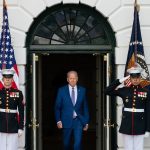A federal appeals court has delivered another blow to the Trump administration’s immigration strategy, opting to maintain a judge’s hold on deportation flights intended for illegal migrants connected to the Venezuelan gang Tren de Aragua. Apparently, Judge James Boasberg, with a track record of dubious legal acrobatics, decided that he knows better than a president when it comes to national security.
Boasberg’s ruling, which temporarily blocks the use of the Alien Enemies Act—a law that has been collecting dust since 1798—raises eyebrows. History might not set a great precedent here, given that this law was specifically designed to address threats from foreign enemies. However, in today’s world of overreaching judicial power, it seems the judiciary is more concerned with hamstringing the executive branch than actually protecting the country. And let’s not forget, there were already two flights carrying alleged gang members in the air while the judge fiddled with his gavel.
Republicans are understandably fuming. They argue that Boasberg’s meddling constitutes a gross overreach of judicial authority, questioning whether a judge should be second-guessing the national security decisions made by the president. It appears that in the judicial halls, some believe they carry a bigger gavel than the commander-in-chief. The final ruling was anything but unanimous, with a 2-1 split among the judges who examined the case—a classic example of judicial activism running rampant.
Appeals court declines to lift judge's order blocking deportation flights under Alien Enemies Act https://t.co/cG1ZU7Qmos
— John Solomon (@jsolomonReports) March 26, 2025
One of the dissenter judges, Judge Justin Walker, did strike a chord of reason in the midst of the chaos, suggesting that the illegal migrants ought to have taken their complaints to Texas, where their legal battles could be legitimately staged. Predictably, that brilliant idea didn’t seem to find its way into the majority opinion, which was busy contemplating the judicial equivalent of existential questions about who has the right to wield wartime powers.
While one judge hypothesized about the government’s ability to utilize wartime authority, it is clear that legal confusion reigns supreme. It raises a critical question: How does a country maintain security when judges act like overzealous referees in a game that requires decisiveness and, dare it be said, some elbow grease? With threats looming from criminal gangs, it seems a bit ridiculous to be tied up in legal nonsense instead of enforcing laws designed to protect Americans.
In the end, the Trump administration’s fight here illustrates a struggle that is far more than a simple immigration case. It showcases a judiciary intent on flexing its muscles at the expense of executive decisiveness, while the nation grapples with the dire implications of allowing illegally operating gangs to flourish. If only judges were as adept at dealing with the security of the nation as they are at finding loopholes to block deportation flights.




